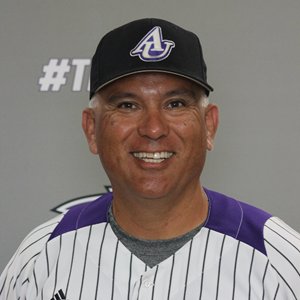 Asbury University coach, Manny Cervantes, does more with what he has to work with than any coach I know and was named “Coach of the Year” in the River States Conference this past spring.
Keith Madison: What did you learn at each of your coaching experiences in pro ball, youth league and college ball that prepared you to be a head coach at the college level?
Manny Cervantes:
Asbury University coach, Manny Cervantes, does more with what he has to work with than any coach I know and was named “Coach of the Year” in the River States Conference this past spring.
Keith Madison: What did you learn at each of your coaching experiences in pro ball, youth league and college ball that prepared you to be a head coach at the college level?
Manny Cervantes: You don’t ever stop learning. I’ve observed the best coaches stay coachable and they are constantly trying to figure out how they can better teach their players. I also believe that people don’t care how much you know until they know how much you care. I think I’ve become a more effective coach when I focus on the entire person rather than just the athlete.
Overall, I want to coach guys the way that I would want to be coached. In Luke 6:31, Jesus tells us to “do unto others as you would have them do unto you.” It’s more important to coach “men” as opposed to just coaching “athletes.” Everything about my players matters to me…their skill level, academics, their personal life and their spiritual life.
KM: As a head coach at the NAIA level, you have to juggle a lot of diverse responsibilities (coaching, of course, monitoring academic progress, field maintenance, recruiting, fund raising, etc). How do you balance that workload and still make family and faith your top priorities?
MC: No doubt, it’s challenging and an ongoing topic. First, I’m thankful my family believes and supports my mission as a coach. However, the reality is that I don’t always balance these areas perfectly. I ask God to help me do the best I can in these areas because my faith enables me to be the best man, husband, father, and coach I can be to the people I care about. The challenge is to be “all there.” When I’m with my wife or my daughters or son, I need to try my best to be one hundred percent with them…not on my cell phone and not thinking about recruiting. When I’m doing my morning devotional and quiet time, I need to be one hundred percent with God. When I’m with my team, I need to be “all in” with them. It’s a challenge and it requires discipline and devotion.
KM: What would you say to a high school coach who wants to transition into college coaching?
MC: A couple of thoughts. First, be the best high school coach possible – be where your feet are. Then, I’d say to connect with college coaches by offering to help with their camps, be a reliable source when they ask about high school players in the area, and attend events like the ABCA convention. However, I’d encourage a coach to ask God where He wants them to coach because I believe we’ll be most fulfilled when we’re coaching the players God wants us to coach.
KM: Coaching at a small Christian college brings both challenges and unique opportunities. What is the most rewarding aspect of coaching at this level?
MC: The opportunity to see how our guys grow during their college years in their faith, studies, and as players.
KM: What would you say to a high school player who loves baseball and has dreamed his entire life of playing at the Dl level, but the offers aren’t coming?
MC: Stay encouraged and determined. There are many great programs other than DI’s across the country to keep playing after high school where they can have a great experience. I think guys that truly love the game of baseball just want to play ball.
KM: Like most college coaches, you end the semester with meetings with your athletes. What do you try to accomplish in these meetings?
MC: Time goes by so quickly during the school year, so I want to make sure I take the time to check in with them on how they are doing as a person, in their studies, and make sure they understand their role on our team. These conversations are not always easy, especially as it relates to playing time, but we ask a lot of our guys, so I think they deserve to know their standing within our program.
KM: Growing up in Los Angeles, how have you adjusted to living in Wilmore, Kentucky, a town many people compare to “Mayberry”?
MC: No doubt it’s different, but I enjoy being able to take our labrador to some fields in the area and let her run around chasing squirrels…definitely not an option in LA. More importantly, we love it here because our family believes this is where we’re supposed to be at this time of our lives.
KM: In one sentence, how would you summarize the role of any coach?
MC: To help each player pursue excellence as men, as students and as athletes.